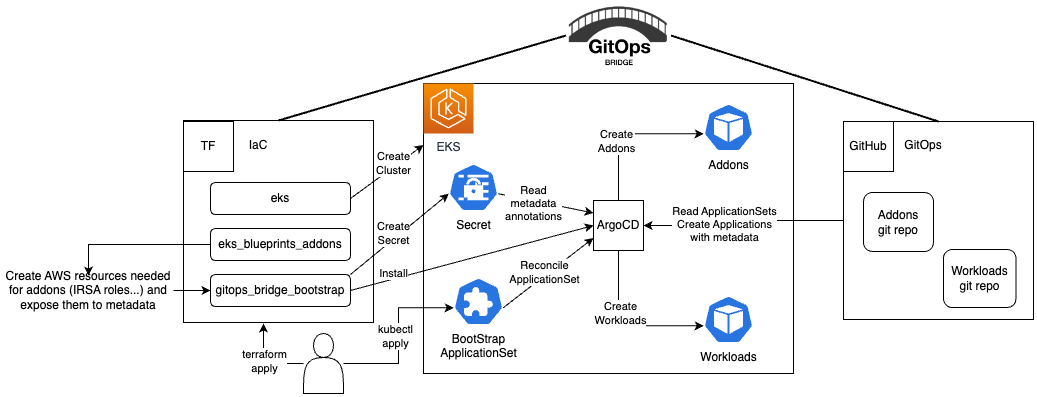This tutorial guides you through deploying an Amazon EKS cluster with addons configured via ArgoCD, employing the GitOps Bridge Pattern.
The GitOps Bridge Pattern enables Kubernetes administrators to utilize Infrastructure as Code (IaC) and GitOps tools for deploying Kubernetes Addons and Workloads. Addons often depend on Cloud resources that are external to the cluster. The configuration metadata for these external resources is required by the Addons' Helm charts. While IaC is used to create these cloud resources, it is not used to install the Helm charts. Instead, the IaC tool stores this metadata either within GitOps resources in the cluster or in a Git repository. The GitOps tool then extracts these metadata values and passes them to the Helm chart during the Addon installation process. This mechanism forms the bridge between IaC and GitOps, hence the term "GitOps Bridge."
Try out the Getting Started example.
Additional examples available on the GitOps Bridge Pattern:
- argocd-ingress
- aws-secrets-manager
- crossplane
- external-secrets
- multi-cluster/distributed
- multi-cluster/hub-spoke
- multi-cluster/hub-spoke-shared
- private-git
Before you begin, make sure you have the following command line tools installed:
- git
- terraform
- kubectl
- argocd
See the appendix section Fork GitOps Repositories for more info on the terraform variables to override.
Initialize Terraform and deploy the EKS cluster:
terraform init
terraform apply -auto-approveRetrieve kubectl config, then execute the output command:
terraform output -raw configure_kubectlTerraform will add GitOps Bridge Metadata to the ArgoCD secret. The annotations contain metadata for the addons' Helm charts and ArgoCD ApplicationSets.
kubectl get secret -n argocd -l argocd.argoproj.io/secret-type=cluster -o json | jq '.items[0].metadata.annotations'The output looks like the following:
{
"addons_repo_basepath": "gitops/",
"addons_repo_path": "bootstrap/control-plane/addons",
"addons_repo_revision": "main",
"addons_repo_url": "[email protected]:gitops-bridge-dev/kubecon-2023-na-argocon",
"workload_repo_basepath": "gitops/",
"workload_repo_path": "apps",
"workload_repo_revision": "main",
"workload_repo_url": "[email protected]:gitops-bridge-dev/kubecon-2023-na-argocon"
"aws_account_id": "0123456789",
"aws_cloudwatch_metrics_iam_role_arn": "arn:aws:iam::0123456789:role/aws-cloudwatch-metrics-20231029150636632700000028",
"aws_cloudwatch_metrics_namespace": "amazon-cloudwatch",
"aws_cloudwatch_metrics_service_account": "aws-cloudwatch-metrics",
"aws_cluster_name": "ex-eks-akuity",
"aws_for_fluentbit_iam_role_arn": "arn:aws:iam::0123456789:role/aws-for-fluent-bit-20231029150636632700000029",
"aws_for_fluentbit_log_group_name": "/aws/eks/ex-eks-akuity/aws-fluentbit-logs-20231029150605912500000017",
"aws_for_fluentbit_namespace": "kube-system",
"aws_for_fluentbit_service_account": "aws-for-fluent-bit-sa",
"aws_load_balancer_controller_iam_role_arn": "arn:aws:iam::0123456789:role/alb-controller-20231029150636630700000025",
"aws_load_balancer_controller_namespace": "kube-system",
"aws_load_balancer_controller_service_account": "aws-load-balancer-controller-sa",
"aws_region": "us-west-2",
"aws_vpc_id": "vpc-0d1e6da491803e111",
"cert_manager_iam_role_arn": "arn:aws:iam::0123456789:role/cert-manager-20231029150636632300000026",
"cert_manager_namespace": "cert-manager",
"cert_manager_service_account": "cert-manager",
"cluster_name": "in-cluster",
"environment": "dev",
"external_dns_namespace": "external-dns",
"external_dns_service_account": "external-dns-sa",
"external_secrets_iam_role_arn": "arn:aws:iam::0123456789:role/external-secrets-20231029150636632600000027",
"external_secrets_namespace": "external-secrets",
"external_secrets_service_account": "external-secrets-sa",
"karpenter_iam_role_arn": "arn:aws:iam::0123456789:role/karpenter-20231029150636630500000024",
"karpenter_namespace": "karpenter",
"karpenter_node_instance_profile_name": "karpenter-ex-eks-akuity-2023102915060627290000001a",
"karpenter_service_account": "karpenter",
"karpenter_sqs_queue_name": "karpenter-ex-eks-akuity",
}The labels offer a straightforward way to enable or disable an addon in ArgoCD for the cluster.
kubectl get secret -n argocd -l argocd.argoproj.io/secret-type=cluster -o json | jq '.items[0].metadata.labels' | grep -v false | jq .The output looks like the following:
{
"argocd.argoproj.io/secret-type": "cluster",
"aws_cluster_name": "ex-eks-akuity",
"cluster_name": "in-cluster",
"enable_argocd": "true",
"enable_aws_cloudwatch_metrics": "true",
"enable_aws_ebs_csi_resources": "true",
"enable_aws_for_fluentbit": "true",
"enable_aws_load_balancer_controller": "true",
"enable_cert_manager": "true",
"enable_external_dns": "true",
"enable_external_secrets": "true",
"enable_ingress_nginx": "true",
"enable_karpenter": "true",
"enable_kyverno": "true",
"enable_metrics_server": "true",
"environment": "dev",
"kubernetes_version": "1.28"
}Wait until all the ArgoCD applications' HEALTH STATUS is Healthy. Use Crl+C to exit the watch command
watch kubectl get applications -n argocdVerify that the addons are ready:
kubectl get deployment -AAccess ArgoCD's UI, run the command from the output:
terraform output -raw access_argocdWatch until the Workloads ArgoCD Application is Healthy
watch kubectl get -n argocd applications -l workload=trueWait until the ArgoCD Applications HEALTH STATUS is Healthy. Crl+C to exit the watch command
Verify that the application configuration is present and the pod is running:
kubectl get -n guestbook deployments,service,ep,ingressThe expected output should look like the following:
NAME READY UP-TO-DATE AVAILABLE AGE
deployment.apps/guestbook-ui 1/1 1 1 3m7s
NAME TYPE CLUSTER-IP EXTERNAL-IP PORT(S) AGE
service/guestbook-ui ClusterIP 172.20.211.185 <none> 80/TCP 3m7s
NAME ENDPOINTS AGE
endpoints/guestbook-ui 10.0.31.115:80 3m7s
NAME CLASS HOSTS ADDRESS PORTS AGE
ingress/guestbook-ui nginx * <>.elb.us-west-2.amazonaws.com 80 3m7s
Verify the application endpoint health using curl:
kubectl exec -n guestbook deploy/guestbook-ui -- \
curl -I -s $(kubectl get -n ingress-nginx svc ingress-nginx-controller -o jsonpath='{.status.loadBalancer.ingress[0].hostname}')The first line of the output should have HTTP/1.1 200 OK.
Retrieve the ingress URL for the application, and access in the browser:
echo "Application URL: http://$(kubectl get -n ingress-nginx svc ingress-nginx-controller -o jsonpath='{.status.loadBalancer.ingress[0].hostname}')"Check the application's CPU and memory metrics:
kubectl top pods -n guestbookCheck all pods CPU and memory metrics:
kubectl top pods -ATo tear down all the resources and the EKS cluster, run the following command:
./destroy.shTo modify the values.yaml file for addons or the workload manifest files (.ie yaml), you'll need to fork this repository: gitops-bridge-dev/kubecon-2023-na-argocon.
After forking, update the following environment variables to point to you fork, replacing the default values.
export [email protected]:<org or user>
export TF_VAR_gitops_addons_repo=kubecon-2023-na-argocon
export TF_VAR_gitops_addons_revision=main
export [email protected]:<org or user>
export TF_VAR_gitops_workload_repo=kubecon-2023-na-argocon
export TF_VAR_gitops_workload_revision=mainOnly applicable if you don't deploy the bootstrap by setting the following variable to false (default true)
export TF_VAR_enable_gitops_auto_bootstrap=falseBootstrap the addons using ArgoCD:
kubectl apply -f ../../gitops/bootstrap/control-plane/exclude/addons.yamlDeploy a sample application located in ../../gitops/apps/guestbook using ArgoCD:
kubectl apply -f ../../gitops/bootstrap/workloads/exclude/workloads.yaml